Adults Ju-Jitsu Classes
Our adults Ju-Jitsu classes are held twice weekly at our club in Leigh. These mixed classes are perfect for adults looking to learn self defence techniques and improve their fitness.
Adults Self Defence Classes in Leigh
Taught by Sensei Alan Francis (6th Dan), our adults Ju-Jitsu self defence classes in Leigh are tailored to be suitable for everyone.
Taking the best techniques from the Japanese Ju-Jitsu system, derived from the WJJF syllabus, Sensei Alan Francis has created a class that will provide you with the skills that you can rely on when you need them most and when you least expect it.
We all know how dangerous it can be simply walking down the street these days. That’s why it’s so important to know how to defend yourself.
With Leigh Ju-Jitsu, you can learn the skills to efficiently defend yourself from an attack. With expert tuition from our instructors and assistance from our team of male and female black belts, we will help you on your Ju-Jitsu journey of self improvement.
We also offer grading opportunities should you wish to enrol on our grading programme to rise through the ranks towards black belt, though this is completely optional.
We invite men and women, beginners and experienced martial artists, to join Leigh Ju-Jitsu at our friendly dojo based near Leigh town centre, off Railway Road.
Improve your agility, cardio and fitness, make new friends and learn new skills at our long-established martial arts club.
Adults Class Timetable
Tuesday – 8pm to 9.30pm
Thursday – 8pm to 9.30pm
Suitable for adults and teens aged 13+.
Cost: £6 per lesson (or £5 for those aged under 16)
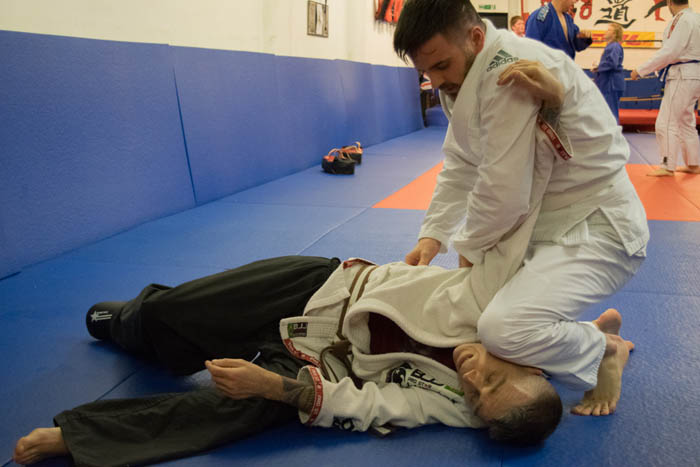
Try Your First Class For Free!
What Does An Adults Ju-Jitsu Class Entail?
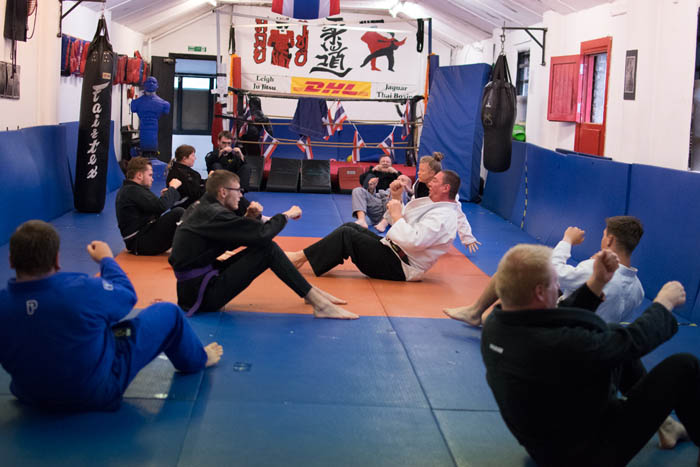
Warm-Up
Warming up our muscles at the start of the class is important to ensure we don’t strain or pull any muscles later on in the lesson.
Our warm ups are structured to improve both cardiovascular fitness and physical fitness, and are often based around practical techniques we use in class, such as bridging, shrimping and shadow boxing.
We also focus on exercises such as press-ups, sit-ups, crunches, and other exercises that hit the core muscles.
We regularly practice our breakfalls too as part of the warm-up part of the lesson. Breakfalls are an integral part of any Ju-Jitsu teachings, as learning to do these properly will help to protect you from injury when being thrown.
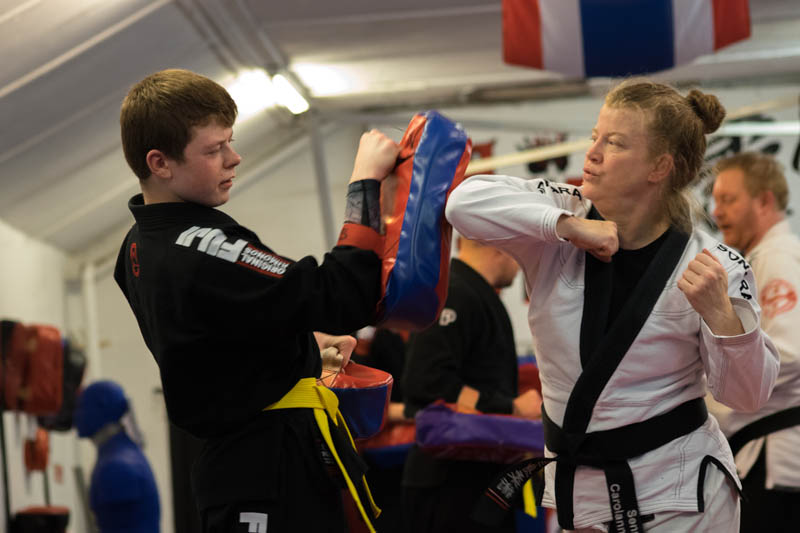
Pad Work
Following our warm up, we break off into pairs to practice our striking on thai pads.
Our pad work routines incorporate punches, hooks, uppercuts, elbows, knees and kicks. Drilling these strikes help to ingrain the combinations into our muscle memory.
Our pad work sessions are an opportunity to improve our striking ability and to increase power and agility. It also contributes to improving our overall fitness.
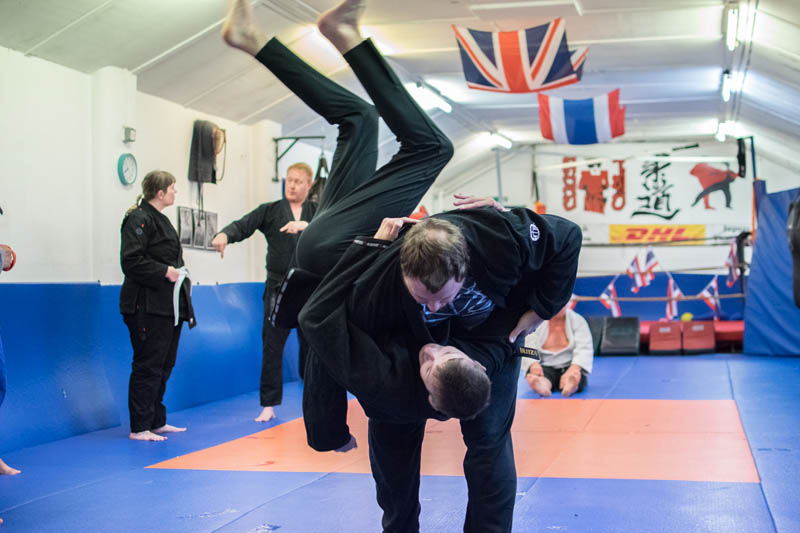
Techniques
The main part of the lesson is where we teach techniques to our students. You’ll get to learn how to defend yourself from a variety of attacks, such as punches, kicks, grabs from behind, chokes, and even weapon attacks.
Most of the throws and takedown techniques we teach incorporate a block, parry, break, slip or dodge of the attack, before following up with strikes to the head or body, and sometimes even a joint lock! But that’s not all! Once taken down, we make sure that the opponent is finished on the ground too, whether that’s with a strike or a submission.
The techniques we practice come from our Ju-Jitsu syllabus as well as our street defence system, so you’ll be learning a lot of traditional throwing techniques and leg reaps, in addition to simple street defence takedowns.
Ju-Jitsu is a brilliant, all-round martial art that provides a little bit of everything to give you a rounded game. If you’ve seen the John Wick film series, then you’ll have an idea on the type of techniques we teach at our dojo (minus the guns, of course!), as Japanese Ju-Jitsu is heavily used in these movies.
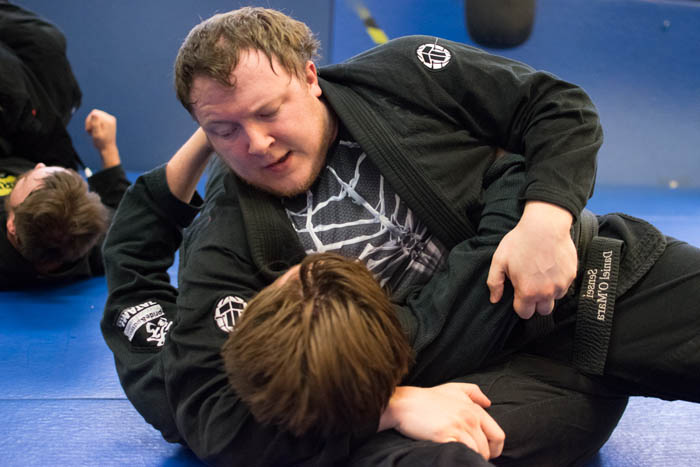
Ground Grappling (Newaza)
If you’re ever in a situation where the fight ends up on the ground, it’s important that you know how to defend and attack from positions so that you can safely escape the situation.
We usually start the class with a few rounds of non-submission grappling to get warmed up, and we end the class with a session of submission grappling on the ground.
Also referred to as BJJ or Brazilian Jiu-Jitsu, grappling is a fantastic way of understanding and learning how to deal with somebody else’s pressure and body positioning.
Through our training, you’ll learn submissions like juji gatame (arm bars), chokes, triangles, as well as a multitude of controlling positions, such as full mount and kesa gatame (scarf hold). You’ll also learn how to defend, pass and escape a variety of positions.
Our grappling sparring session allows you to practice the moves you’ve learnt against opponents, who too will be trying to execute their gameplan and get the upper hand. Live grappling provides an unrivalled experience in how to deal with an opponent, forcing you to use your skills and improve your awareness and timing. Some of our students even enter grappling competitions where they can pit their skills against others of a similar rank and weight.
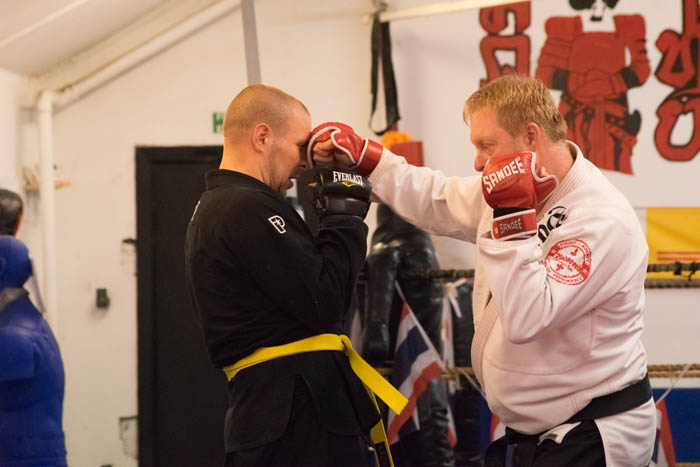
Sparring
We occasionally hold sparring sessions in class where we practice light striking, takedowns and ground-and-pound grappling with our training partners.
These sparring sessions involve wearing 7oz MMA sparring gloves and foam or leather shin guards to protect ourselves and our partners from injury. It’s also recommended that you were a gum shield too.
Our light contact sparring sessions provide you with experience on the reality of exchanging strikes with an opponent and will teach you how to overcome obstacles, forcing you to improve your head movement, footwork, timing, blocking and striking.
As opponents in reality can hit back, we find sparring a useful exercise that allows us to simulate the situation for our students so they can experience it in a safe way from which they can practice, learn and grow from.